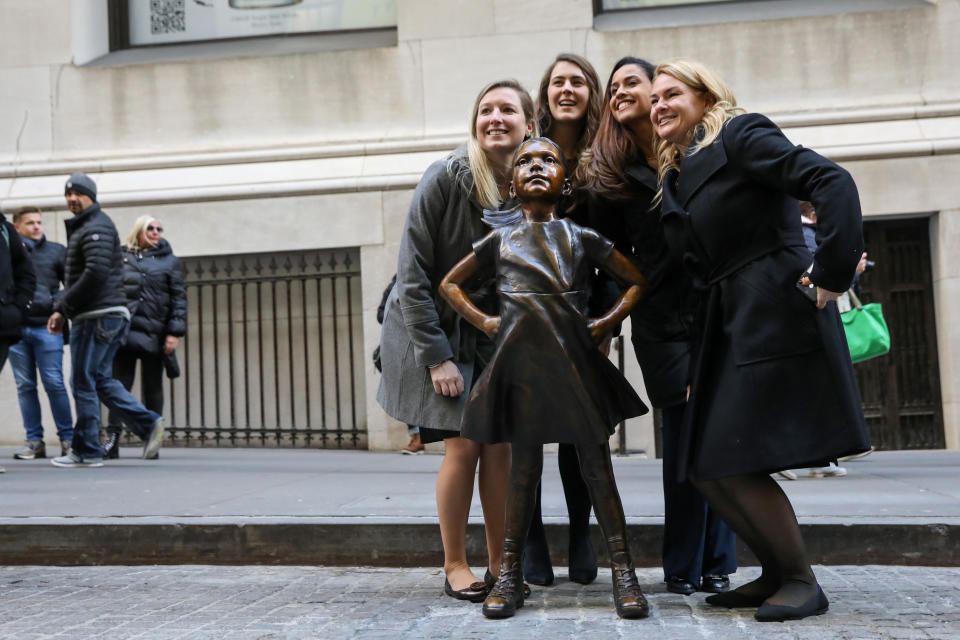How women, not men, face discrimination at work for being overweight

Discrimination levelled at women in the workplace comes in a whole host of different forms. If they choose to have children, they risk being overlooked for promotion. If women are assertive, they’re labelled “bossy” or “bitchy.” More often than not, professional women are held to a higher ethical standard than men.
And research has shown women are far more likely to be judged based on their appearance at work – not just their clothes, hair and makeup, but also their weight. It’s called size discrimination and it’s a very real, and often overlooked, problem that disproportionately affects women at work.
According to research published earlier this year by LinkedIn, discrimination regarding weight is common in UK workplaces. Workers classed as obese are paid £1,940 ($2,457) less per year than their colleagues, with women classed as “overweight” or “obese” — according to their BMI — receiving £8,919 less on average each year than their male coworkers.
Researchers also found that almost a quarter of workers (21%) who are overweight felt they had been passed over for a job or a promotion because of their weight. In addition, more than half of those classed as plus-sized said they felt they had been left out of a team because of their weight.
And size discrimination doesn’t just affect women once they’re in a job, it also makes them less likely to be hired in the first place.
In a 2016 study by Sheffield Hallam University, participants were asked to evaluate candidates for different types of jobs based on their hypothetical CVs and photos featuring people of different weights. The results revealed that participants rated the obese job seekers as less suitable for employment, compared with slimmer candidates – and obese women were the least likely to be given jobs.
Last year, the jobs site Fairygodboss carried out a survey of 500 hiring professionals, who were
shown a photo of an overweight woman and asked if they would consider employing her. Only
15.6% of them said they would — and 20% said they thought she was “lazy.”
So why are overweight women more likely to be discriminated against when it comes to work? Firstly, it’s well-known by now that women are subject to constant scrutiny when it comes to their bodies and they are under pressure to conform to certain “beauty ideals” — which generally differ depending on where you live. Those who don’t fit these “ideals” are often treated unfairly.
Additionally, though, the discrimination of overweight women in the workplace is also likely to do with the stereotyping of obese people as “less physically capable and slothful,” according to the Sheffield Hallam researchers.
Scientists have established there is link between the way we look and how people perceive us. Earlier this year, a study published in Psychological Science found that our first impressions of new people are partly based on their body shape.
A survey of 140 different realistic body models found that those who were larger were generally associated with more negative traits, such as being lazy or careless. Meanwhile those who were slimmer were linked to positive traits, such as being enthusiastic or self-confident. So what are your rights when it comes to size discrimination?
“Unfair treatment because someone is overweight or because of the way they look is not specifically protected under the Equality Act 2010,” says a spokesperson for Acas, which provides legal and workplace relations advice to employers and employees.
“To amount to discrimination in such cases, the treatment because they are overweight or because of the way they look would have to be linked to one of the features of life specifically protected under the Equality Act, such as their sex, because they are pregnant or because they have a disability,” they add.
In 2014, for example, the European Court of Justice ruled that obesity can constitute a disability if it hinders a person’s ability at work.
But these cases are rare, which means the majority of size discrimination goes unchecked. To tackle the problem, bosses need to ensure their staff aren’t being bullied or treated differently because of their appearance.
“Employers need to ensure obese employees are not subjected to offensive comments or behaviour because of their weight and that obese job applicants are not discriminated against because of their weight,” the Acas spokesperson adds.
This means taking note of unpleasant comments directed at staff, making sure people aren’t being overlooked, and questioning your own beliefs about weight, to address conscious and unconscious bias.
To find out to navigate a toxic work environment, download Yahoo Presents Its a Jungle Out There podcast on Apple Podcasts, ACast, or Google podcasts to listen while on the go.

